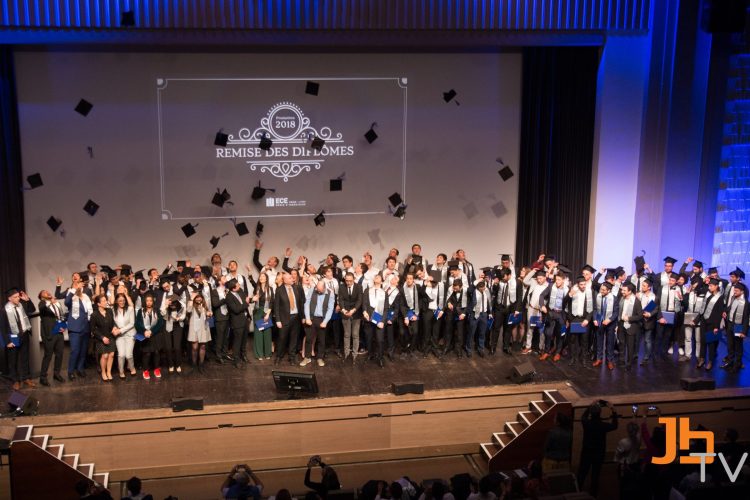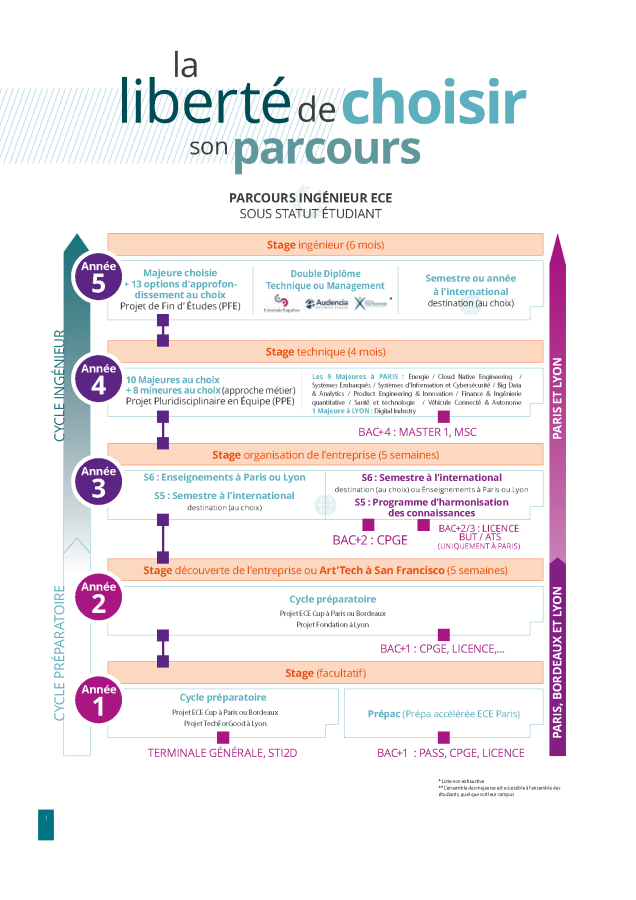ECE’s mission is to give meaning to technologies so that they become innovations and a lasting part of the progress of our society, to train daring engineers who create value in new technologies and finally, to promote the values of entrepreneurship and innovation in a CSR approach.

François STEPHAN
School Director
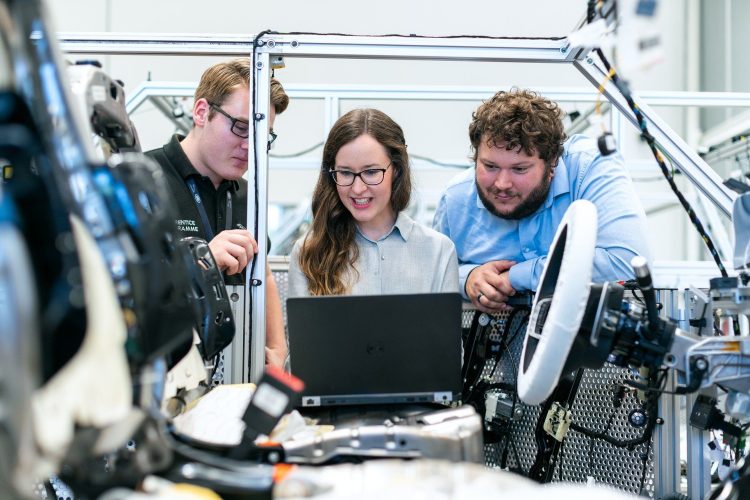
Apprenticeship, a springboard to professionalization
Acquire professional experience while following theoretical training provided by teachers and professionals, that’s the training offered by ECE thanks to the apprenticeship engineering degree.
Work-study training meets a strong demand from companies wishing to train operational engineers at the end of their studies.
Apprenticeship training leads to the same diploma as conventional training.
Apprenticeships are available from the 2nd year of the engineering degree.
How to become an engineer
In France, engineers are protected by the CTI (Commission des Titres d’Ingénieurs), which regulates the scope of their skills. These skills are not limited to scientific knowledge and mastery of technology. In its definition, the CTI points out that, in addition to technical means, engineers use financial and human resources. And for Gen Z students, who want their actions to be meaningful, the CTI emphasises the objective of ‘collective well-being’.

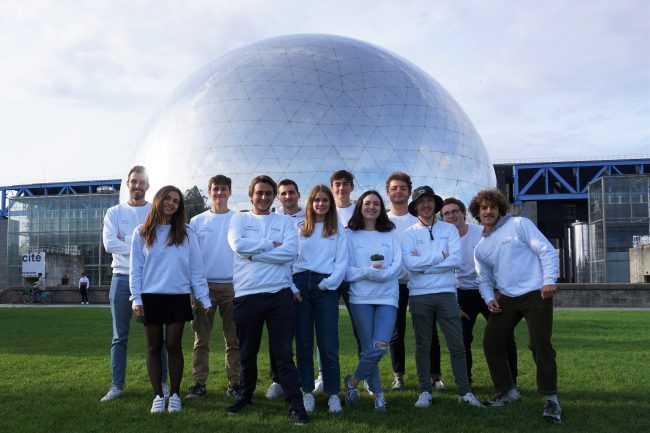
How can you discover digital technologies through our engineering program?
Transition, evolution, revolution, digital technologies have not finished making news. These changes create ruptures that go beyond the technological field, they disrupt economic models, established paradigms and forms of learning. These innovations create worries and rejections, but they do bring progress, and we must accept that they are a challenge to what exists. This uncertainty may seem anxiety-provoking, but we must see it as an opportunity to reinvent our society.
Reinventing society means putting people at the heart of innovation. Reinventing society with digital technologies makes engineers central players, committed to building a more inclusive and humane world.
Choose your path with the Grande École Engineering Program
At ECE, each student chooses freely his or her path according to his or her tastes, personal aptitudes and professional project.
ECE is the school of 1001 possible paths – no path is identical, our students are all different. We give our students the building blocks to build the path of their dreams, the path that resembles them and that will best guide them towards their professional and personal ambitions.
Fabienne Coudray, Head of Cycle L at ECE, talks about the Engineering Program
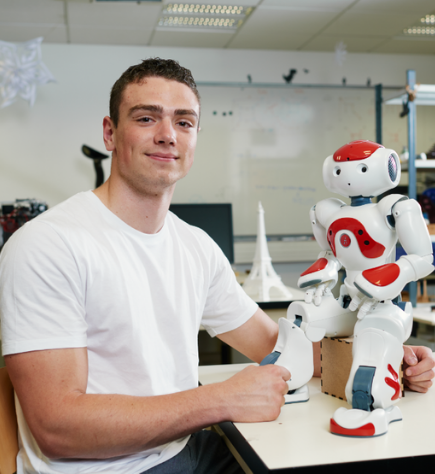
The integrated preparatory cycle (ING1 and ING2)
Students in the ECE’s integrated preparatory cycle don’t wait until they enter the engineering cycle to discover and practice the technologies that will serve them throughout their professional lives. Learning these technologies begins in the first month of the first year and continues into the second year.
Details of the First Year of the Engineering Program
The 1st year of the engineering program is divided into a 1st semester of knowledge harmonization for the “newcomers” and the international semester for students from the integrated preparatory program. The harmonization program differs according to the students’ backgrounds (CPGE, L2/L3, DUT, Spé TSI, ATS): the “scientists” follow technological courses, and the students from technological fields follow science courses. In the second semester, students who enter the engineering program directly also have the opportunity to study abroad at a partner university. More than 65% of these students choose to go abroad.
For their 2nd and 3rd years of the engineering cycle, students must choose their specializations from among 8 majors, 8 minors and 11 in-depth options.
The Engineering program can also be taken as an apprenticeship.
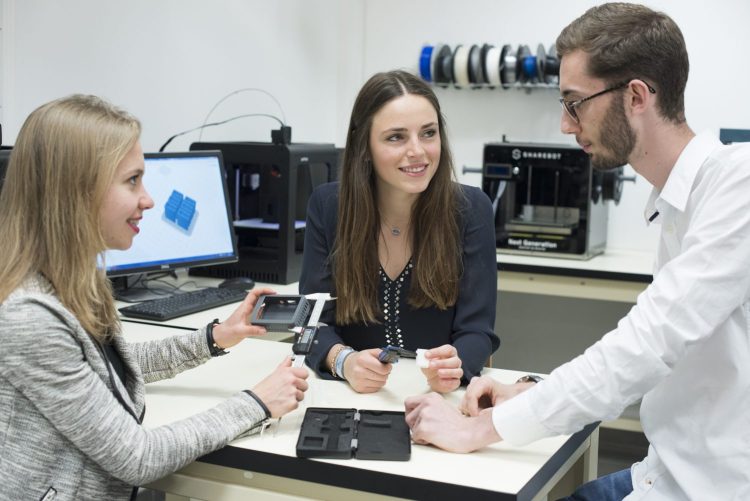
Discover our Engineering Program specializations
The 12 technology majors are chosen by each student in the 2nd year of the engineering cycle.
A major covers a very broad technological field.
It enables students to delve deeper into this field, while developing a general interest in information technologies.

Engineering Degree – Data & AI Major
Read more
Engineering Degree – Cloud Engineering & Management Major
Read more
Engineering Degree – Cybersecurity Major
Read more
Engineering Cycle (Bac+4) – Defense & Technology major
Read more
Engineering Degree – Digital Transformation & Innovation Major
Read more
Engineering Degree – Energy & Environment Major
Read more
Engineering Degree – Finance & Quantitative Engineering Major
Read more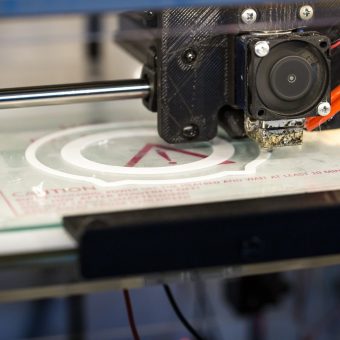
Engineering Degree – CReATE Major
Read more
Engineering Degree – Connected & Autonomous Vehicle Major
Read more
Engineering Cycle (Bac+4) – Defense & Technology major
Read moreEngineering Program minors

By choosing a “minor” whose content is transversal to technologies and whose objective is to help actively prepare their professional project, engineering students acquire decisive skills for their career.
Advanced options in the Engineering Program

In-depth options complete the final year’s syllabus, enabling students to focus on a promising sector or expertise in cutting-edge technologies.

Project-based teaching with the Engineering Program
Since 2012, thanks to the Investissements d’Avenir and IDEFI label, the Student Project Assessment, known as VPE (Valorisation des Projets Étudiants), program has been the central pivot of ECE’s innovative pedagogy. A veritable field of observation for pedagogical innovations, it enables ECE to establish privileged relationships with industrialists, national laboratories and higher education establishments.
VPE is a program based on an inductive pedagogy that aims to cover all the stages in the development of a product.
innovative project, from the idea to its implementation. This scheme commits all students of the last two years of the ECE to excellence. This is reflected in a majorproject support program (mentors and experts).
How can I get a double engineering degree?
In ING5, our engineering students can choose to follow a double-diploma curriculum to obtain a second Grande École diploma in addition to the ECE diploma, or to follow a more specialized curriculum, becoming an engineer-manager for example.
